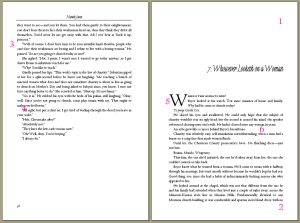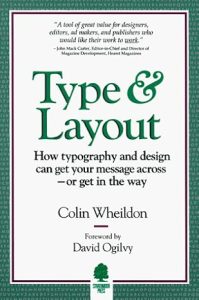I AM AGAINST DIGITAL RIGHTS MANAGEMENT (DRM). ANY VENDOR I RECOMMEND WILL SHARE THIS STANCE AND ANY INSTRUCTIONS I GIVE WILL IGNORE ANY POSSIBILITY FOR ENCRYPTION. IF YOU WANT TO LOCK UP YOUR WORK, FIGURE IT OUT YOURSELF.
In my last episode, I instructed you to go learn (X)HTML/CSS. I was gently taken to task for that with the point, “writers shouldn’t have to learn code.” While I am of the opinion that for some writers, this is not only true, but that they should be kept from any computer interaction whatsoever, I’m afraid it’s just not realistic in the long run. You will learn something, even if it’s only the paragraph tags and all of it will be useful to you at some point.
Yes, you can use blogger.com or wordpress.com or any other sign-in platform for your blogging.
Yes, you can use Word and PrimoPDF to set type and distribute your work as a free PDF.
If you want to:
A. want to offer more than one file format (PDF) and/or
B. want to charge for your work
you’re going to have to either pay someone to do it for you or learn how to do it yourself.
There are quite a few places that will help you with #A.
FEEDBOOKS. As far as I can tell, if you use this service, you must offer your work for free. If this is not acceptable to you, just don’t use their service. (And if this isn’t true, let me know because I scoured the site and couldn’t find any “payment” type information. ) Also, you must manually build your book. Now, this has its pros and cons. The con is that it takes a while. The pro is that you can make it look purty with a little care and attention without having to learn much (if any) (X)HTML/CSS.
BOOKWORM. This is a peculiar service in that you may upload your own book, but the only format you get is the EPUB format. It is also more for reading than publishing (as far as I can tell; more information on this is welcome).
SMASHWORDS. This is the Q-DOS of e-book building/formatting. It’s very quick. And yeah, sometimes it’s dirty, especially if you don’t format your Word document correctly (as in, according to standard word processing practices and to SmashWords’s style guide). That’s the con. The pro is it’s fast and you can charge for your work.
I’m making several assumptions here. The FIRST assumption is that you want your book to be in as many electronic formats as possible. The SECOND assumption is that you want to have those formats available to you on your own hard drive for dissemination as you please. The THIRD assumption is that you want your work to have widespread visibility across the interwebz. The FOURTH assumption is that you might want to get paid for your work.
So let’s talk about SmashWords.
I heard about SmashWords from Eugene Woodbury quite a while back, who used it for his novel Path of Dreams, but I dismissed it because I thought the work had to be offered free. Then Zoe Winters used it for her free novella “Kept.” Okay. But then Aaron Ross Powell used it to offer his draft of The Hole in more formats than Kindle right after I bitched about it. Then RJ Keller used it to offer Waiting for Spring, and that’s when I had the V-8 moment.
I figured, well, what the hell, I’ll try this thing. So I took a vignette from The Proviso‘s world (not in the book) called “25 to Life” and decided to put it on Smashwords.
CAVEAT: “25 to Life” did not call for fancy formatting like The Proviso does. The Proviso has blog posts, e-mails, news clippings, court transcripts, social services records, a wedding announcement, and other specialized formatting that required different fonts, spacing, and margins to make those items look good. If you have something like that, this WILL NOT WORK for you.
Assumption 1. That you want your book to be in as many electronic formats as possible.
They have this nifty little API they call the “MeatGrinder.” It will turn a plain, properly formatted Word document into any one or more of the following digital formats:
| Format |
Full Book |
| Online Reading (HTML) |
View |
| Online Reading (JavaScript) |
View |
| Kindle (.mobi) |
Download |
| Epub (open industry format, good for Stanza reader, others) |
Download |
| PDF (good for highly formatted books, or for home printing) |
Download |
| RTF (readable on most word processors) |
Download |
| LRF (for Sony Reader) |
Download |
| Palm Doc (PDB) (for Palm reading devices) |
Download |
| Plain Text (download) (flexible, but lacks much formatting) |
Download |
| Plain Text (view) (viewable as web page) |
View |
.
As you can see, that’s a lot of variation. I got both The Hole and Waiting for Spring in the RTF format, as that was the easiest for me to convert to my eBookWise reader. Powell asked for $2.99 and Keller offered hers for “you set the price.”
Assumption 2. That you want to have those formats available to you on your own hard drive for dissemination as you please.
I don’t even know if you have to buy it yourself (if you set a price) to download which formats you want to offer from your own site or elsewhere, but even if you do have to, you got off cheap in both time and money.
Don’t be an ass. Be courteous and leave it up on SmashWords. They did the work for you.
You will NOT be able to get a straight HTML document to download and then tweak to other formats, which is good.
Assumption 3. That you want your work to have widespread visibility across the interwebz.
The founder of SmashWords, Mark Coker, says: “Our mission is to give every author a chance to find their audience.”
SmashWords is gradually gaining in name recognition and usage. Augment your presence on SmashWords with placement of your work elsewhere on the ’net. It benefits you and SmashWords (you know, the people who did the work for you).
Assumption 4. You might want to get paid for your work.
There are several payment options at SmashWords, which I’ve addressed. In my first “creating ebooks” post, commenter and indie author champion Morris Rosenthal told me about e-junkie.com, which is a payment portal for downloads. He’s had quite a bit of success with this method, though I can’t vouch for it at this time (although I do intend to check it out).
However, as far as I know, SmashWords is the only independent e-publishing vendor that offers an API process AND a payment portal and quite frankly, there’s just nothing else that beats that, even if you do have to sacrifice a little formatting.
So after having put “25 to Life” up on SmashWords, used their API, seen their output, what do I think?
The HTML and Java versions (the ones that you read on your computer) are very pretty and you can adjust fonts, colors, and sizes as you like.
The plain TXT ones are, well, plain text. It says “may lack some formatting,” but if you know anything about plain text, you know that means NO formatting.
The EPUB (use with Stanza for iPhone/iTouch, Adobe Digital Editions) format doesn’t seem to have centered anything, but I can live with that.
The LRF (Sony) and PDB (Palm) didn’t pick up the italics, which is something I CAN’T live with, but it’s being worked on right now (no promises!).
The PDF looked like a manuscript because, well, it comes from a plain Word document, so you know that going in.
The MOBI/PRC (Kindle, MobiPocket) looked great.
The RTF is obviously going to look just like a Word document, and it’s my go-to for conversion to IMP (eBookWise), so I don’t care how it looks.
If you follow the SmashWords style guide to the letter, you’ll have a slew of decent-looking e-books (including EPUB!) as defined by my last post on “the page” and you’ll get them in about 3 minutes, along with a payment portal.
SmashWords is an elegant little API, and it’s still in beta testing. I can’t wait to see what it’ll be at full force.

 But lately, there’s been a lot of cross- and mis-labeling going on inside genre fiction, leading readers to scratch their heads and wonder, “This isn’t X. Why did they put it on X shelf?”
But lately, there’s been a lot of cross- and mis-labeling going on inside genre fiction, leading readers to scratch their heads and wonder, “This isn’t X. Why did they put it on X shelf?” Not that long ago, esoteric specialized trades with their own secrets began to write how-to books. I still liken this to the groundbreaking
Not that long ago, esoteric specialized trades with their own secrets began to write how-to books. I still liken this to the groundbreaking 
 I’m over at
I’m over at  It’s been a long time since I threw common sense to the wind and stayed up to finish a book knowing how much I had to do the next day, but not resenting it the next day because it was totally worth it.
It’s been a long time since I threw common sense to the wind and stayed up to finish a book knowing how much I had to do the next day, but not resenting it the next day because it was totally worth it. Started. I wanted to read this book but then saw the ebook price ($11.30! for an ELECTRONIC book!!!), bitched about it, then was offered a copy if I would review it, which I will. I will admit, however, that I find myself reading it through the filter of some blogging unpleasantness elsewhere.
Started. I wanted to read this book but then saw the ebook price ($11.30! for an ELECTRONIC book!!!), bitched about it, then was offered a copy if I would review it, which I will. I will admit, however, that I find myself reading it through the filter of some blogging unpleasantness elsewhere. Started. This seems more of a visual novel to me (I’m a visual reader) and I have to have some quiet time to do it. Between the DDJ (damned day job) and the Tax Deductions, finding sufficient quiet time has been difficult.
Started. This seems more of a visual novel to me (I’m a visual reader) and I have to have some quiet time to do it. Between the DDJ (damned day job) and the Tax Deductions, finding sufficient quiet time has been difficult. Zoe is an independent publisher I “met” by happenstance when I got soundly thrashed on Dear Author for suggesting that a multi-published author whose 3-book SERIES contract had been canceled after book 2 (leaving her fans out in the cold with characters they loved) actually self-publish the third book in the series (you know, since her rights had reverted back to her and she already has a fan base salivating for it). Good gravy, you’d’a thunk I’d said the Rapture was coming tomorrow and they’d all be left behind and have 666 burned into their foreheads bwahahahahaha burn in hell losers.
Zoe is an independent publisher I “met” by happenstance when I got soundly thrashed on Dear Author for suggesting that a multi-published author whose 3-book SERIES contract had been canceled after book 2 (leaving her fans out in the cold with characters they loved) actually self-publish the third book in the series (you know, since her rights had reverted back to her and she already has a fan base salivating for it). Good gravy, you’d’a thunk I’d said the Rapture was coming tomorrow and they’d all be left behind and have 666 burned into their foreheads bwahahahahaha burn in hell losers.



 I’ve had a lot on my mind lately that I haven’t been able to untangle, much less unpack on an issue-by-issue basis. What are they?
I’ve had a lot on my mind lately that I haven’t been able to untangle, much less unpack on an issue-by-issue basis. What are they?